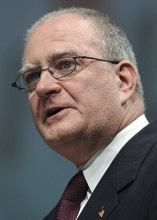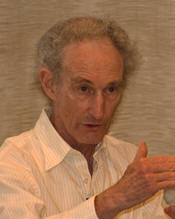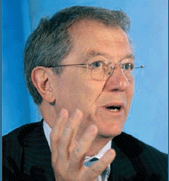|
Editorial-31 January 2008 |
|
|
|
|
|
|
|
Robert May |
A Chief Scientist Can be a Most Influential of Advisors or an Ineffective Advocate for Science |
 John Marburger III |
Chris Mooney, writing in Seed Magazine a few weeks back wrote:
You really have to feel for physicist John Marburger, President Bush's long-serving and controversial science adviser. Not only was Marburger appointed very late in 2001—seemingly as an afterthought—but when he finally got the job, it came with a diminished title [Science Adviser to the President]. Unlike his most recent predecessors, Marburger was not named "Assistant to the President" on science matters. Furthermore, many of Bush's most contested science policy decisions, on issues like embryonic stem cell research and climate change, had been announced before Marburger achieved his official Senate confirmation. As a result, the physicist often found himself defending administration stances even though he hadn't been at the table when some of them were set.
In fact Mr Mooney reports science historian: "Gregg Herken put it to me in a recent phone conversation, [that the position] has reached 'a kind of nadir' under the Bush administration."
Robert May was 23 when he obtained his doctorate in theoretical physics from the University of Sydney, after 13 years he switched to population biology prior to taking a position at Princeton University. In 1988 he moved to Oxford University as a world leader in mathematical biology becoming in 1995, Chief Scientific Adviser to John Major's Tory Government, and headed the Office of Science and Technology. He was retained when the newly formed government of Tony Blair was installed. While Chief Scientific Advisor, he continued fundamental research in mathematical biology as well as seeking policies that could be applied to the resolution of environmental problems. In 2000 he became President of the Royal Society of London and Cambridge's David King became Chief Scientific Advisor.
In contrast to John Marburger Professor May was influential in the formulation of national scientific affairs. Both Tony Blair and then Chancellor of the Exchequer Gordon Brown showed both interest and active support for science, and the appointment of the billionaire David Sainsbury, a science aficionado, who was made, at his request, Parliamentary Under-Secretary of State at the Department for Trade and Industry with responsibility for Science and Innovation in the House of Lords was highly influential.
Aside from his brilliance, Robert May had a sympathetic milieu. Had circumstances been different for John Marburger, his contribution for American science might have been quite different to his underachievement under the Bush administration.
A little over a month ago (January 21) the journal Science reported an interview it had with David King as he neared the end of his seven-year term as the UK government's chief scientific advisor. Asked how had British Prime Minister Tony Blair become an advocate for scientific research, Professor King replied:
The prime minister was very impressed by the enormous strength of the science base in Britain. Measured by citations, we're second in volume only to the United States, and measured by citations per pounds invested, we're ahead of the rest of the world by a very long stretch. What followed from that was his understanding that using this enormous strength to create wealth for the U.K. was a key way forward in the competitive globalized economic system.
When asked: "What would have been your priorities if, in a parallel universe, you had been President George W. Bush's science adviser?" Professor King gave an answer which demonstrated why President Bush, or for that matter Australia's former prime minister, John Howard, would never have picked him to hold the office of "science advisor" or "chief scientist".
My mantra since I took on this job has been openness, honesty, and transparency, which means that I have delivered my advice to the prime minister and Cabinet, but the prime minister and the Cabinet also know that in order to maintain the trust of the government and the public, I will submit my advice into the public domain. I would not take a job of this nature if I couldn't do that.
|
|
|
Professor David King Credit: Alan Weller/ Bloomberg News/ Landov |
Last week the Canadian Government announced that it was dismantling its office of the national science adviser. The decision to create a national science advisor was taken by Paul Martin's Liberal government in April 2004. The Conservative government led by Steven Harper has now determined that a national science advisor isn't required. If nothing else the move shows Mr Harper to be more decisive than John Howard who might as well have removed the chief scientist's office from the public payroll.
The term of Australia's current chief scientist, Dr. Jim Peacock, is scheduled to end in February 2008.
Which brings us to Kevin Rudd and how he will exercise his prerogative as prime minister in determining the parameters of the Office of Chief Scientist, and who will occupy it.
In opposition Labor promised to make the chief scientist's position full-time. But while John Marburger's position is full-time, the UK's chief scientific advisor, as was the case with his predecessor, remained an active academic overseeing continuing research projects.
Four days a week were given over to being chief scientific advisor.
This question of full-time vs part-time misses the point. And while it's probably too much to ask to have our prime minister search for, find and then appoint to the position an active, brilliant, independent-minded polymath with outstanding communication skills, it mightn't be a bad goal to shoot for.
Of course it's also a requirement to listen to and consider what's advised.
Some members of cabinet appear to be better at it than others.
Alex Reisner
The Funneled Web

